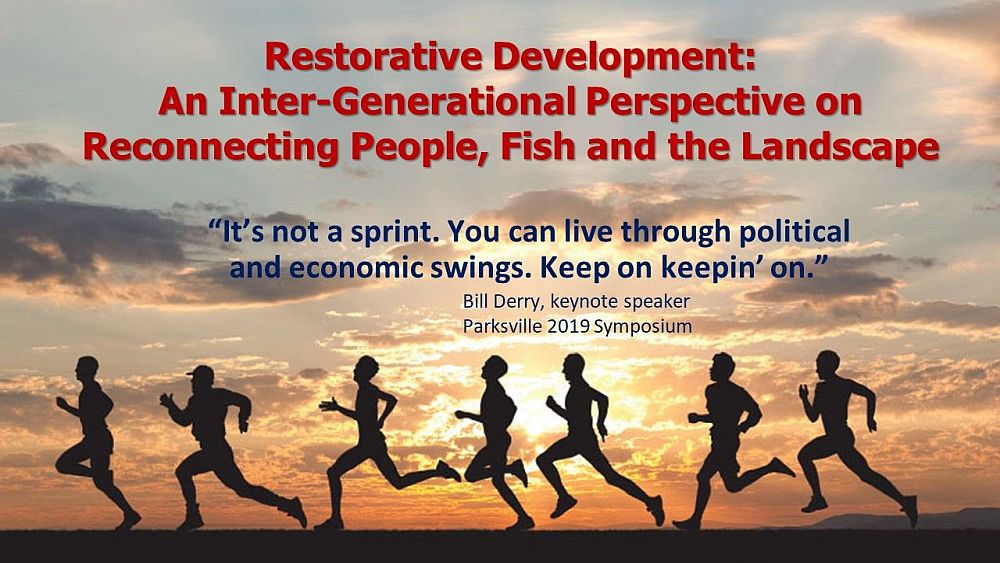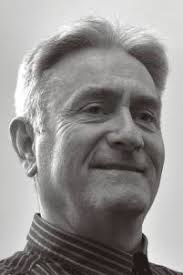An Inter-Generational Perspective on Reconnecting People, Fish and the Landscape
Note to Reader:
In our weekly Waterbucket eNews, we celebrate the commitment, hard work and perseverance of individuals who strive to make a difference for the common good vis-à-vis land and water management in British Columbia. Below, we honour the contributions of three elders (John Finnie, Eric Bonham and Graeme Bethell) whose pioneer work some 15 years ago continues to have ripple effects on Vancouver Island and beyond. They remind us that creating greener communities and adapting to a changing climate is not a sprint. It is a marathon. It is not one individual; it is a team effort. It is a lifetime commitment.

“Water Sustainability will be achieved by implementing Green Infrastructure policies and practices,” stated John Finnie, Founding Chair, CAVI-Convening for Action on Vancouver Island: Leadership for Water Sustainability
Throughout B.C. today, there are many “elders in action” still doing good work, applying a lifetime of experience and passion to tackle local, regional and provincial matters. Now is the time to learn from their efforts and what it means to be knowledgeable, giving one’s time for the common good, working on solutions, and getting results. Elders in action are beacons of hope for re-connecting people, fish and the landscape.
Eric Bonham, John Finnie and Graeme Bethell shared a vision in 2005. They were leaders of a grass-roots initiative on Vancouver Island called Meeting of the Minds. A year later, the initiative was re-branded as CAVI-Convening for Action on Vancouver Island: Leadership in Water Sustainability. In 2012, CAVI morphed into the Georgia Basin Inter-Regional Educational Initiative (IREI).
Jointly funded by the Ministry of Environment, Ministry of Municipal Affair and the Real Estate Foundation of BC, and supported by local governments on the east coast of Vancouver Island, the multi-year CAVI program was launched in conjunction with the 2006 Water in the City Conference held in Victoria.
The multi-year Vancouver Island Showcasing Green Infrastructure Innovation Series and the Vancouver Island Learning Lunch Seminar Series were signature CAVI initiatives. The success of the two series provided the springboard for the current IREI program which continues the legacy of the provincial government’s Georgia Basin Initiative, launched in 1994 under the leadership of the late Erik Karlsen.

The New Business as Usual
In 2008, launch of the outreach program for Living Water Smart, British Columbia’s Water Plan commenced with a precedent-setting approach to capacity-building in the local government sector. Implemented in the Comox and Cowichan valleys, it was a demonstration application of how to build inter-departmental and inter-governmental alignment to achieve the Living Water Smart vision for adapting to a changing climate and creating greener communities.
“We are using the slogan The New Business as Usual to convey the message that, for change to really occur, practices that until now have been viewed as the exception must become the norm moving forward. We have to build regulatory models and develop models of practice and expertise to support The New Business as Usual,” stated Dale Wall, then the Deputy Minister of Municipal Affairs, when he announced the Vancouver Island Learning Lunch Seminar Series at the 2008 Gaining Ground Summit.
The 2008 announcement is posted on YouTube:
What’s a Learning Lunch?
“Learning Lunches created opportunities for local government representatives to share ideas and discuss innovative approaches and solutions to local water problems. Attendees were encouraged to participate in group discussions and brainstorm on matters of common interest with respect to water sustainability,” explains John Finnie, CAVI Chair (2006-2011).
 “Generally limited to about 50 attendees, these low cost forums were always well attended and well received. Seminars ran for about 5 hours. The sessions included presentations on current water issues, lots of progressive discussion amongst attendees and, of course, lunch. By sharing ideas, attendees often left with fresh ideas or solutions to one or more of their own local problems.
“Generally limited to about 50 attendees, these low cost forums were always well attended and well received. Seminars ran for about 5 hours. The sessions included presentations on current water issues, lots of progressive discussion amongst attendees and, of course, lunch. By sharing ideas, attendees often left with fresh ideas or solutions to one or more of their own local problems.
“The sessions also provided opportunities to develop camaraderie and professional networking opportunities on Vancouver Island. Some of the connections and relationships established through the series continued for many years, or even a lifetime.
“When we came up with the Learning Lunch idea, our objectives and expectations were quite modest. We wanted to explore a collaborative approach that would align efforts. The original inter-departmental concept for the Vancouver Island Seminar Series resonated with willing local government partners. The idea quickly mushroomed into an inter-governmental program.”

Quotable Quotes
“ CAVI was a prototype for a water-centric approach that is guided by inter-generational commitment to action. It will take time and therefore requires perseverance. Simply put, it is a long distance relay race. The future of Vancouver Island calls for ‘cathedral thinking’ to create an inter-generational vision that is inspirational, pragmatic, and based on a strong foundation,” says Eric Bonham, former Director in the Ministries of Environment and Municipal Affairs, and a founding member of the Partnership for Water Sustainability in BC.
CAVI was a prototype for a water-centric approach that is guided by inter-generational commitment to action. It will take time and therefore requires perseverance. Simply put, it is a long distance relay race. The future of Vancouver Island calls for ‘cathedral thinking’ to create an inter-generational vision that is inspirational, pragmatic, and based on a strong foundation,” says Eric Bonham, former Director in the Ministries of Environment and Municipal Affairs, and a founding member of the Partnership for Water Sustainability in BC.
“The CAVI initiative envisioned a Vancouver Island based on long-term sustainability and water resiliency models that involve innovative partnerships. The results guide us towards effective land and water management practices.”
 “In 2005, there were a number of initiatives on Vancouver Island that were focusing upon the theme of sustainability. It was a matter of seeking out partnerships to reinforce the common theme of sustainability based upon an island wide communications information exchange network,” continues Graeme Bethell, engineer and author.
“In 2005, there were a number of initiatives on Vancouver Island that were focusing upon the theme of sustainability. It was a matter of seeking out partnerships to reinforce the common theme of sustainability based upon an island wide communications information exchange network,” continues Graeme Bethell, engineer and author.
“We did a survey. It was clear that there was widespread interest in holding a workshop that would provide an opportunity for the exchange of information, and to explore the possibility of establishing a communications network for the Vancouver Island region. This resulted in Meeting of the Minds workshops in consecutive years. The rest is history.”
Water Stewardship in a Changing Climate
John Finnie is also the Founding Chair of the current Vancouver Island Symposia Series on Water Stewardship in a Changing Climate. He provides this perspective:
“The series highlights the power of collaboration among local governments, environmental organizations, First Nations, elected officials and industry representatives. Collaboration helps to understand the ecology and hydrology of the natural and built environments so that we can effectively respond to changes. We need to understand and appreciate that what happens on the land in creeksheds matters to streams.
“Two successful symposiums have been held to date: Watershed Stewardship in a Changing Environment – Collaboration Success Stories, 2018 in Nanaimo, and Water Stewardship & Restorative Development, 2019 in Parksville. Both were well received, featured headline speakers and provided opportunities to learn about local government initiatives in British Columbia, in Canada and in the United States that support restorative development.
“Restorative Development is an exciting new concept where public and private entities are investing in protecting and restoring local environments because of the resulting social and economic benefits. An economic model was presented that places a monetary value on natural systems. This allows local governments to balance ‘the value of nature’ against resource development to establish an overall life-cycle analysis.”
The third in the series is proceeding as the Video Trilogy Series; and will be broadcast via YouTube.

In the age of COVID, thought leaders must find new ways to connect with and inspire an audience
But how do you inspire someone over a computer? Addressing this challenge was the starting point for “Watershed Moments, the Video Trilogy Series”. It moves well beyond a Zoom webinar by using YouTube to provide a viewer experience that will be comparable to viewing an engaging TED Talk.
The focus of the Video Trilogy Series is on the whole-system approach, connecting land and water, and restoring water balance in altered landscapes. At the conclusion of each video, viewers will be able to chat in real-time with the presentation team.
TO REGISTER, VISIT
https://www.civicinfo.bc.ca/event/2020/Third-Water-Stewardship-Symposium-Reimagined



